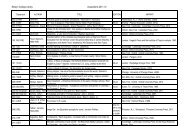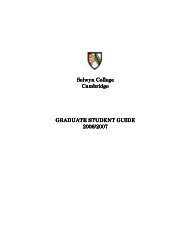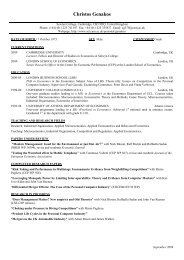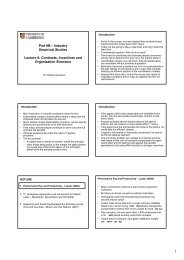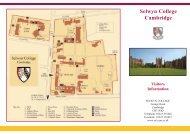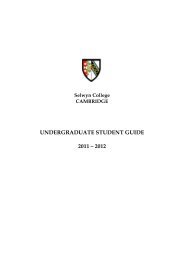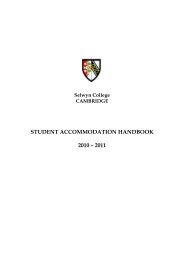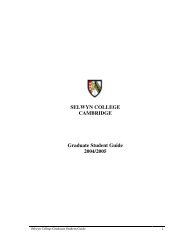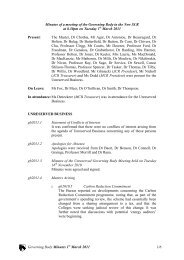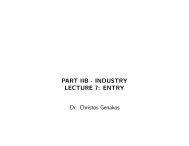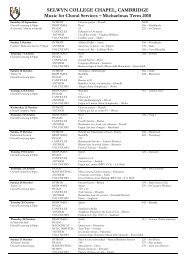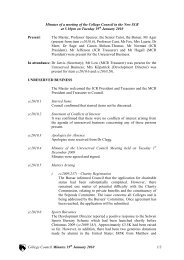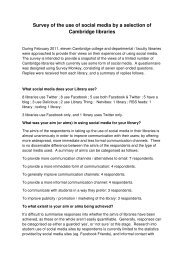Undergraduate Student Guide 2012-2013 - Selwyn College ...
Undergraduate Student Guide 2012-2013 - Selwyn College ...
Undergraduate Student Guide 2012-2013 - Selwyn College ...
You also want an ePaper? Increase the reach of your titles
YUMPU automatically turns print PDFs into web optimized ePapers that Google loves.
3.3.4 Examination Failure<br />
It is emphasized that the number of students affected by the contents of this section is usually no more<br />
than one or two a year. In some years none are affected. It is, however, necessary to make clear the<br />
procedures in the event of academic failure.<br />
All undergraduates are required to sit an exam at the end of each year. These are usually Tripos or<br />
Prelim examinations. Where no such exam is set, or where a Director of Studies judges it more<br />
appropriate, a <strong>College</strong> exam will be set. In order to proceed with your studies at <strong>Selwyn</strong> the next year,<br />
you must achieve the minimum of a Third Class, i.e. to have performed to Honours standard. Failure is,<br />
therefore, defined as not being included in the class list for Honours in a classed exam, not being<br />
approved by the examiners in an unclassed Prelim, or obtaining a mark below Honours standard in any<br />
other sort of exam. Where the <strong>College</strong> enters a student for part of a Prelim but not for all papers, the<br />
marks on those papers sat will be the ones considered. In the technical language of the University, there<br />
is a category between outright failure and Honours. This is ‘Granted an Allowance towards the Ordinary<br />
Degree’. To be given such an allowance is regarded by <strong>Selwyn</strong>, as by other <strong>College</strong>s, as failure.<br />
The University’s regulations governing the award of degrees do not permit resits.<br />
Where failure is the demonstrable outcome of ill-health or other incapacitating circumstances, the<br />
University is ready to take this into account (see 3.3.6 Safety nets). In the very few cases where an<br />
undergraduate fails a University or <strong>College</strong> exam without a successful application to the University, he<br />
or she loses the right to continue with his or her course. In all such cases of failure, the undergraduate<br />
has a right to appeal against the decision to send him or her out of residence.<br />
Such appeals are heard at a special meeting of senior members of the <strong>College</strong> Council in early July.<br />
The Council has the right to permit any undergraduate to return into residence notwithstanding his or<br />
her failure, and to attach any conditions it feels fit to that decision (for example, by requiring a further<br />
<strong>College</strong> exam immediately before the Michaelmas Term next following, or by requiring that specific<br />
academic work be successfully undertaken during the Long Vacation).<br />
An undergraduate making an appeal to the <strong>College</strong> Council has the right to appear and to speak in<br />
person, as well as to be represented by his or her Tutor. The undergraduate’s Director of Studies and any<br />
Fellow of the <strong>College</strong> who has taught him or her may also be present. At the hearing, the Senior Tutor is<br />
required to produce a document which includes the student’s supervision reports, precise examination<br />
marks and other relevant information, before concluding with a recommendation. The document will<br />
have been shown to the undergraduate in advance. After members of Council have had the opportunity<br />
to direct questions both to the undergraduate and to those senior members who are in attendance, the<br />
undergraduate, his or her Tutor, the Director of Studies, any Fellow who has taught the undergraduate,<br />
and the Senior Tutor will be required to withdraw for the Council to deliberate and decide. The decision<br />
of the appeal body is final.<br />
The Council does not have the power to set aside the University’s Tripos regulations. If it decides that<br />
the student should be allowed to return into residence, but the latter is not, as far as the University is<br />
concerned, in standing to proceed to an honours degree in the subject in question, it becomes necessary<br />
either for the student’s Tutor to make a retrospective case to the Applications Committee of the<br />
University Council for the grant of an ‘Allowance’, or for the student to be allowed by the <strong>College</strong><br />
Council to change to a subject for which he or she is in standing.<br />
3.3.5 Proceeding to the final year of four-year courses<br />
In Natural Sciences, Engineering, and Mathematics, it is possible to take a degree over four years without<br />
a change of Tripos. The rules about who may progress to a fourth year are set by the relevant Faculty<br />
and vary from subject to subject. In some cases the <strong>College</strong> reserves the right to require a higher standard<br />
than that set by the relevant Faculty.<br />
In Natural Sciences, the standard needed at Part II for progression to Part III varies from subject to<br />
subject. <strong>Student</strong>s should consult their DoS to find out the relevant details.<br />
22 <strong>Selwyn</strong> <strong>College</strong> <strong>Undergraduate</strong> <strong>Student</strong> <strong>Guide</strong> <strong>2013</strong>-14




